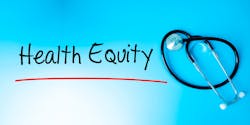A group of healthcare and technology organizations has developed a Health Equity Tracker, a data platform that can highlight and address the impact of COVID-19 and other diseases on the Black, Indigenous, Latinx, Asian, Pacific Islander, and other vulnerable and marginalized communities.
The companies involved in the work—the Satcher Health Leadership Institute at Morehouse School of Medicine (SHLI), with support from Gilead Sciences, Inc., Google.org, the Annie E. Casey Foundation, and the CDC Foundation—have come together on what officials call “the premiere health equity-focused data visualization solution, capable of tracking multiple conditions and determinants that have impacted COVID-19 outcomes and exacerbated health inequities.”
Built as a “forward looking, scalable platform, the Health Equity Tracker can ingest multiple data sets ranging from social and political determinants of health, demographics, and other variables, resulting in a novel, comparative approach to assessing and conceptualizing health inequities,” they contend.
At launch, the tracker records COVID-19 cases, deaths, and hospitalizations nationwide across race and ethnicity, sex and age, as well as by state and county. The tracker also measures comorbidities associated with COVID-19, including COPD, diabetes, and social and political determinants of health, including uninsured and poverty rates.
Additionally, the tracker will expand in the future to include additional conditions such as mental and behavioral health, as well as more social and political determinants of health that impact vulnerable communities, including persons with disabilities, LGBTQ+ individuals, and lower socioeconomic status people, officials noted.
The pandemic has certainly reinforced the reality of longstanding inequities throughout the U.S. healthcare system. We have learned that the virus itself disproportionately impacts minority communities, and inequitable vaccine distribution has also been a challenge. COVID-19 data has revealed that Black and Hispanic individuals are receiving smaller shares of vaccinations compared to their shares of cases and deaths, and compared to their shares of the total population in most states, although over the last few weeks there has fortunately been a narrowing of racial gaps in vaccinations at the national level, according to the Kaiser Family Foundation (KFF), which has been tracking these trends.
One specific example reported by KFF is in Colorado, whereas of two weeks ago, 10 percent of vaccinations have gone to Hispanic people, despite accounting for 41 percent of cases, 25 percent of deaths, and 22 percent of the total population in the state.
As such, officials of this new collaboration assert that the tracker “provides a unique contribution to the COVID-19 data landscape by specifically highlighting the significant data gaps that exist for vulnerable populations. The tracker's emphasis on unknown and missing data, as exhibited using map visualizations, points to the work ahead towards improved data collection and reporting standards.”
What’s more, they note, “the tracker demonstrates the often perceived invisibility of health inequities among populations, which may largely be masked by lack of data. Despite these data gaps, COVID-19 data from the tracker demonstrate that the disease disproportionately impacts people of color, particularly Black and Latinx communities.” Indeed, according to the tracker data, 38 percent of COVID-19 cases reported unknown race and ethnicity.
Policymakers, public health officials, advocates, and community organizers can use the data to create actionable, evidence-based policy changes to attain health equity and ensure that disproportionately impacted communities receive resources and support, they say.
"A game changer, while still in its initial phases, the Health Equity Tracker will provide us the opportunity to track the health inequities plaguing this country," Daniel Dawes, executive director of the Satcher Health Leadership Institute at Morehouse School of Medicine and author of the book, "Political Determinants of Health,” said in a statement. "Moreover, the tracker will enable us to find solutions that move beyond merely identifying areas and populations afflicted by these boundless health inequities. We are excited to work with key policymakers and partners to drive these solutions to create equitable policies that will alleviate the burden of the deeply rooted political determinants of health for all."
Google.org, the technology company's philanthropic arm, also helped support the build out of the Health Equity Tracker with $1.5 million in funding and a team of Google.org Fellows. For the last nine months, more than 18 Google.org Fellows have worked hand-in-hand with the SHLI leadership team and donated more than 15,000 pro-bono work hours providing technical expertise in the areas of data analytics, engineering, product development, UX research and design support for the Tracker. Working, officials said.
"The pandemic has taken a disproportionately devastating toll on communities of color, proving that equity is the most important step to recovery," said Ivor Horn, M.D., director of product inclusion and health equity at Google. "SHLI's Health Equity Tracker unlocks essential data and insights that will help inform public health experts, policymakers, community leaders and other key decision-makers as they work to better understand and address the health disparities impacting BIPOC communities throughout the United States. Making information more accessible and useful is the cornerstone of Google's mission and we're proud to support this critical work not just with our funding, but with our Googler expertise as well."
Meanwhile, Gilead, a research-based biopharmaceutical company, provided $1 million to SHLI to support the development of the Health Equity Tracker, the creation of a Black Health Equity Alliance, and the development of a COVID-19 Health Equity Task Force. The Black Health Equity Alliance has forged integral connections with Black organizations to develop health equity materials and numerous public service announcements to overcome vaccine hesitancy amongst Black communities.
"COVID-19 has exposed the racial inequities in our system, not created them, and we will continue to work with our partners like the Morehouse School of Medicine to create more equitable health outcomes for all," said Douglas M. Brooks, vice president of advancing black equity & community engagement, public affairs at Gilead Sciences. "The tracker launched by SHLI provides crucial information that will give us better insight into the health inequities faced by vulnerable communities and provide the greater health community with more knowledge to help mitigate disproportionate disease impacts."


